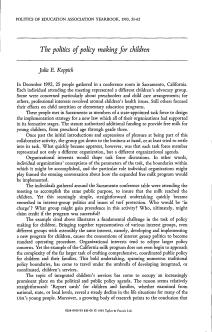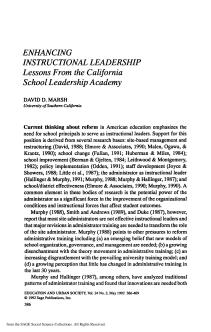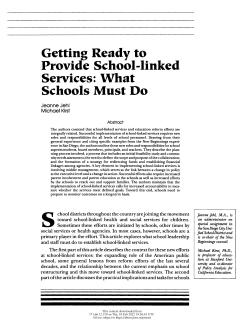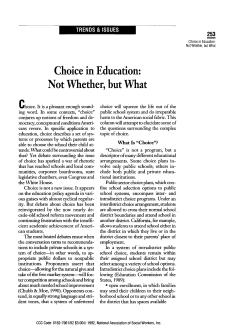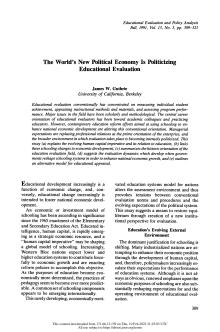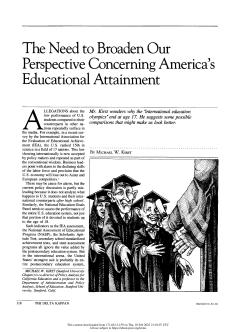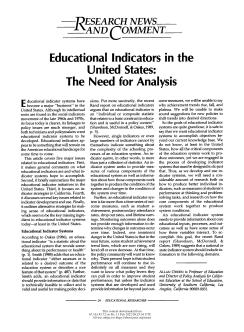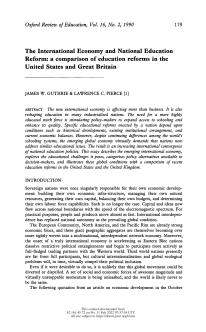Published
Summary
The politics of policy making for children is complex due to the multiple interest groups involved. Fragmented policies exacerbate the problem of declining life situations for children. A comprehensive children's policy is needed, but traditional interest-group approaches to policy development must shift to integrate services for children. California's politics of children's policy is briefly explored. The current political paradigm must fundamentally change to open policy doors for broad-based integrated services for children.
Lessons from the California School Leadership Academy
Published
Summary
American education reform stresses the importance of principals as instructional leaders, but most are not effective in this role. Research suggests that innovative administrator training is needed to transform the role of site administrators. Content and process criteria have been identified, and several state-sponsored training programs have been established to meet them. One such program is the California School Leadership Academy, which provides a three-year program for aspiring and practicing site administrators with an emphasis on instructional leadership.
What Schools Must Do
Published
Summary
This article contends that school-linked services and education reform efforts are integrally related. Successful implementation of school-linked services requires new roles and responsibilities for all levels of school personnel. Drawing on general experience and citing specific examples from the New Beginnings experience in San Diego, the article outlines these new roles and responsibilities for school superintendents, board members, principals, and teachers. It describes the planning process involved, a process that includes an initial feasibility study and community needs assessment; a...
Published
Summary
School finance has become a prominent issue again due to court decisions and litigation in several states. This article explores school finance changes in the 70s and 80s and outlines key issues for the 90s, including the relationship between finance and education goals, site-based management, teacher pay, accountability, school choice, and nontraditional issues such as preschool and non-educational services for children.
Not Whether, But What
Published
Summary
Debate over school choice has been reignited due to the school reform movement and frustration with low academic achievement. The conversation becomes heated when private schools are included in the system of choice, as proponents believe it will foster competition and improve schools, while opponents argue it will harm public schools and society. This article aims to shed light on the complex issue of school choice.
Published
Summary
Traditionally, educational evaluation has focused on measuring student achievement and program performance. However, education reforms are now linking schooling to economic development, leading to a shift towards managerial expectations and politicization of the field. This article explains the human capital imperative and its relation to education, summarizes the history of educational evaluation, and outlines an alternative model for educational appraisal in the context of government-led education system reforms aimed at enhancing national economic growth.
Published
Summary
The U.S. ranks low in international education comparisons, but the discussion is misleading because it does not look at postsecondary education. The value added by the postsecondary education system, including community colleges, trade schools, and universities, is ignored. The U.S.'s strongest suit is probably its entire postsecondary education system in the international arena.
The Need for Analysis
Published
Summary
Educational indicator systems are in demand in the US due to their strong linkages to policy issues. This article covers five major issues related to educational indicators, including what they are, major initiatives in the US, and indicator strategies in California. It also discusses key issues related to indicator development and use and outlines alternative strategies for making sense of educational indicators, which are currently missing in the US.
A Comparison of Education Reforms in the United States and Great Britain
Published
Summary
The new global economy is reshaping education worldwide, necessitating policies that expand access and enhance quality. Despite different educational systems, similar issues need to be addressed, resulting in an international convergence of education policies. The article discusses the emerging economy, educational challenges, policy alternatives, and compares recent reforms in the US and UK.
